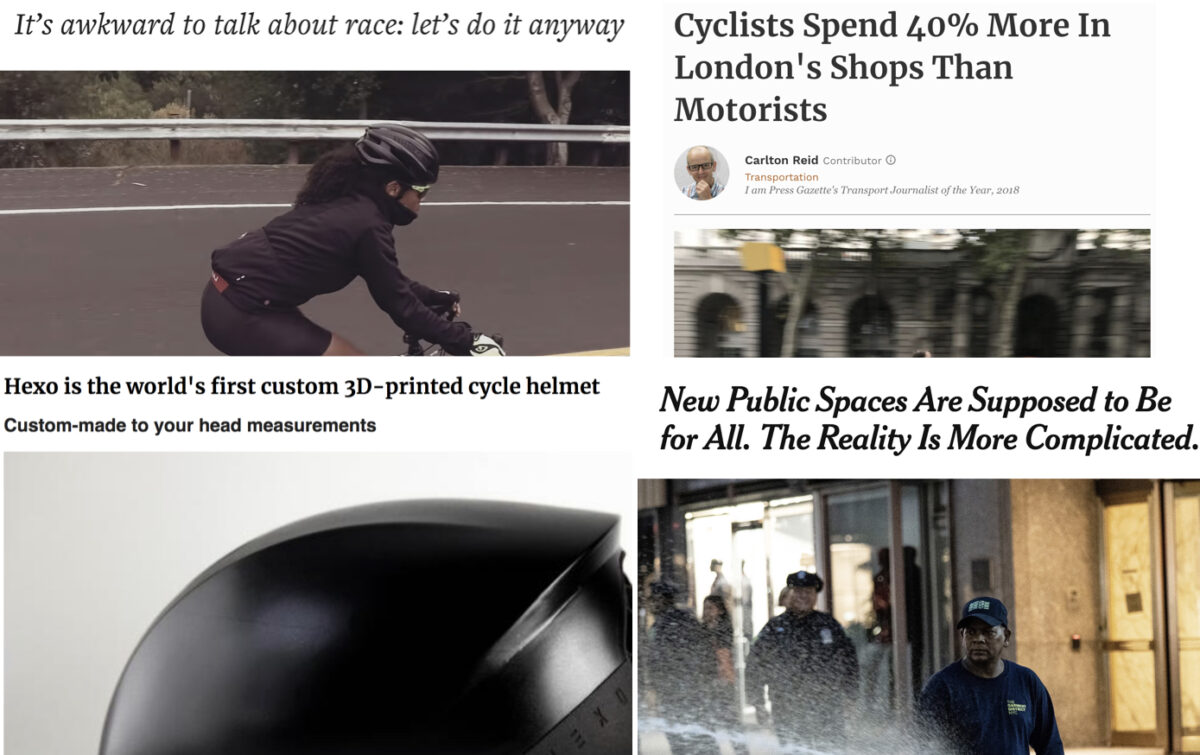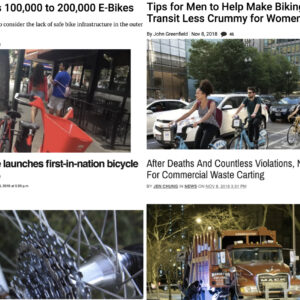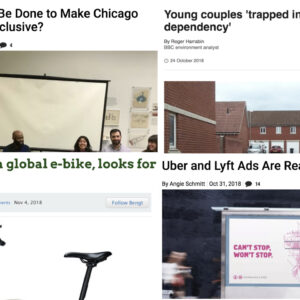Here are the most notable stories we came across in the past week…
Fewer cars = more business: New research from London (once again) proves that businesses on streets with bikeways do better than those located on streets dominated by auto users.
Plazas for whom?: Public plazas are sought-after amenities, but cities that have them are struggling to manage the presence of homeless people who sleep in them and sometimes make others feel uncomfortable. (You can bet this is one reason why Portland hasn’t created more of them.)
Bike shop closures: Nearly half (40) of Performance stores across the country are going to close because its parent company has filed for bankruptcy. There’s one Performance store in Portland (Mall 205) and one in Beaverton and Tualatin as well, but no final list of closures has been published.
Cars are over: Young adults don’t love cars as much as automakers want you to believe, making them ripe for the mobility revolution we all know is coming.
The truth about driving: Recent wildfires where thousands of people tried to flee on car-choked streets inspired this amazingly candid assessment of what it’s like to drive in Los Angeles in 2018.
Pink tax: A new study found that women spend more on transportation than men, largely because of the behavior of men.
Advertisement
Lime cars: Not satisfied with just scooters and bikes, Lime is poised to drop 500 cars on the streets of Seattle.
Cool helmet: The new Hexo is a 3D printed, customizable helmet made from a new type of aerospace industry material.
Anti-driving leadership spreads: Paris Mayor Anne Hidalgo has an unlikely endorsement of her strong policies against driving in the city: Mayors from suburban cities who have agreed to ban the use of diesel cars in the name of better air quality.
UCI’s new sock regs: Looking to stem the scourge of long socks, pro cycling’s governing body now says they can only go half way up your lower leg.
Ayesha McGowan: She wants to be the first black female professional road racer; but she’ll gladly accept merely inspiring other people of color to take up the sport.
Farewell Faraday?: Makers of one of coolest e-bikes on the market, Faraday, appears to be shutting down.
— Jonathan Maus: (503) 706-8804, @jonathan_maus on Twitter and jonathan@bikeportland.org
Never miss a story. Sign-up for the daily BP Headlines email.
BikePortland needs your support.








Thanks for reading.
BikePortland has served this community with independent community journalism since 2005. We rely on subscriptions from readers like you to survive. Your financial support is vital in keeping this valuable resource alive and well.
Please subscribe today to strengthen and expand our work.
The Perf manager here in town, of the 3rd best performing store out of 106, says that the plan is for 46 stores to survive in less competitive markets like ours and the other 60 will eventually be closed, including the 40 mentioned on the first round. He also noted that the chain’s #2 best performing store in Ventura CA was being closed, along with 13 other stores in that state, including 5 in the Bay area, and all their Florida stores. A list exists somewhere.
As you might note on the BRAIN story that there are links to recent election campaigns by Performance & ASE insiders. Those two campaigns in Pennsylvania cost a lot of money. I wonder, is it just a coincidence between the election victories, their campaign debts, and the bankruptcy declarations?
The Tualatin store is definitely closing, but the Beaverton one will not be closing.
We stopped by there on Saturday because I needed a new helmet and have some points to burn, and we were told that we couldn’t redeem any points (or earn them) because the store is closing.
I bought the helmet anyway, it was on a good sale, and I wanted to make sure the employees in this store know that I appreciated them being my local bike shop for all those years. I remember when they were over in Lake Grove by the 24hr Fitness — bought my first new bike there, and have taken it back to them for maintenance regularly.
I’m bummed to see them go, they were the closest bike shop to my work.
Ah, yes. What to do with the homeless. Eugene now spends more money hassling them, moving them around, and cleaning up their trash than it would cost to provide basic housing and a few necessities. Yet voters who complain about the homeless problem are the same ones that re-elect politicians who dismiss obvious solutions to the problem. Like the old saying goes, you can’t save people from themselves.
Portland spends almost half a billion dollars each year on “public safety”. Just imagine what could be achieved if 200 million was spent each year on supportive housing and on maintaining and creating affordable housing.
I imagine more people would move here to take advantage of it and that we’d still have a homeless problem.
Perhaps instead of basing policy on your “imagination” we could begin to take an evidence-based approach when it comes to addressing this chronic societal failure.
https://www.politifact.com/california/article/2018/jun/28/dispelling-myths-about-californias-homeless/
https://www.motherjones.com/politics/2015/02/housing-first-solution-to-homelessness-utah/
Remind me why the concept of Induced Demand only applies to roadway construction and not housing?
Because if you build more lanes, people will drive more, but if you build more housing, people will not start living in more than one dwelling?
We do have a net population growth going on, so there is a influx of new demand.
Also, the oft-cited Litman article states that mode shift does occur with new capacity.
I guess you’ve never heard of vacation homes, short term rentals, etc?
Of course I’ve heard of them. Short term rentals are not housing. Vacation houses are irrelevant in Portland, especially when discussing induced demand.
They are absolutely relevant, because both take housing off of the market for residents. My brother currently lives in the rental side of a duplex. The other side is owned by a wealthy couple from Seattle that uses it a few times of year when they are visiting family in Portland. This is near 28th and Division.
You beat me to it on that reply!
Soren seldom deals in concrete economic theory, though.
Soren,
the Salt Lake City experiment might not be as successful as you’d like to believe. Just like building additional demand for roads, there IS an initial improvement before things stabilize. If you’re going to suggest we all need to educate ourselves with evidence-based approaches, I’d advise being objective instead of selective when it comes to what you post.
https://www.deseretnews.com/article/865678779/Is-Utah-still-a-model-for-solving-chronic-homelessness.html
Where have I argued that there one “fix everything” solution to housing insecurity? In addition to supportive efforts we must also address the root causes of houselessness: economic eviction and rental housing speculation.
https://www.nlchp.org/ProtectTenants2018
The idea that these chronic societal failings are not addressable is false as can be seen by the example of many nations that are less wealthy than the USA and have far less housing insecurity. Moreover, some of these approaches have been successfully implemented at the city-level:
https://www.huduser.gov/portal/pdredge/pdr_edge_featd_article_011314.html
You never address the elephant in the room. Personal responsibility. I get tired of hearing nothing but it’s “housing crisis”.
What good is low income housing for people with zero income? Are we supposed to give free houses to people who want nothing more than to be left alone so they can get drunk or high?
Recent reports indicate that SLC’s approach has actually not been a cure-all and may not have had the impact we believed when those articles came out in 2015: https://www.theguardian.com/us-news/2017/sep/22/salt-lake-city-homeless-people-missing
Oops, missed your post, MOTRG
*Citation needed.
The problem with plazas and public spaces in many cities, including Portland, is that there are not enough of them, and they are not diverse enough. Portland has a lot of great parks, but lacks hard surface, commerce-adjacent spaces.
Perhaps the issue is that American city design tends to build Plazas as an island surrounded by roads on all sides, whereas in Europe they tend to be a pedestrian-only environment, from face to face of the buildings on all sides.
Exactly. Imagine Pioneer Square if you could walk out the doors of the surrounding buildings directly into the plaza space, without worrying about even looking both directions.
Sadly, the most authentic plaza experience around here may be Bridgeport Village.
And that you often have to walk to the plaza in the first place.
“Which song is about driving for a living, to towns like Tucson and Tucumcari.”
Willin’ by Little Feat.
Poor Tehachapi and Tonapah, always left out.
Not to mention Teec Nos Pos. Now that was a small town.
I’ve spent time in two of those three locations.
Let’s get the PBA a subscription to Forbes magazone: 12 copies of that issue.
Faraday is a big loss. Fantastic bikes.
Where’s the songwriter that can write and sing about cycling like Lowell George and Chuck Berry could about driving?
Queen did Fat Bottomed Girls (gotta watch the video to see the reference) and Nazareth sang My White Bicycle. There’s probably more. Kraftwork with Tour de France?
Not to mention Queen’s Bicycle Race…
Dang it. That’s what I meant. Getting old and forgetful. Is feeble next?
But FBG does have a bike reference, which I didn’t realize until you mentioned it.
Sure, homeless people tend to gather and use public spaces. They use them more than most for obvious reasons. I’m not sure why, but somewhere along the way we decided to make sure our public spaces don’t have basic amenities like bathrooms. We know that we have unhoused people. We know that what few amenities are available to them are often near our downtown plazas and such. We know that people generate human waste. Hmm, why is it such a leap to realize we need to provide public restrooms?
Would we rather have disease outbreaks like happened in San Diego last year? Is it really better to clean human waste off the sidewalk than to clean bathrooms?
As to the argument that if we fund facilities to deal with our homeless issue (restrooms, campgrounds, housing, drug treatment, laundry, food, …) that all the homeless in the nation will show up on our doorstep: Do we really think that Sacramento, Orange County, Seattle and other hotbeds of homelessness won’t copy us? Are we really so convinced we’re the most caring people in the world? I strongly suspect, but of course cannot prove, that any city that shows how to humanely reduce homelessness will find itself copied by dozens of others.
While it’s good to see the French government at various levels taking baby steps towards combating climate change, the recent protests against a small increase in the tax on diesel is worrisome. Even more worrisome is the fact that Macron has terrible polling numbers, so we may see climate change denial become a path to the French presidency, like happened to one of France’s allies (ahem).
https://www.washingtonpost.com/world/europe/minister-says-409-injured-in-gas-tax-protests-around-france/2018/11/18/acbf8d92-eb5c-11e8-8b47-bd0975fd6199_story.html?utm_term=.9f63ac905d47
Typically, bike industry upheaval like closures and consolidations portend a recession. We are overdue for one and with illiterate dotard at the helm and absolutely bonkers equity prices, everything’s in place for another dot com AND housing crash, combined.
And just in time the Fed is creeping up the interest rate. They hate to miss a party. Fortunately we’ve got new hotels you’ve never heard of all over the shop downtown (built with all that cheap money no doubt) and a lot of people with no fixed address even _before_ the recession. Hmmm, what to do. It’s going to take a couple of years, but after the shakeout we may have addresses with no people.
I’m sure the PBA will come up with a way to turn them into parking garages.
The UCI micro-managing race wardrobe choices is very possibly the stupidest first-world problem I’ve ever heard of.
The Atlantic piece about LA driving says “The whole trip of about 50 miles takes anywhere from one and a half to three hours.” I kept thinking jeez, even a slowbie like me could bike 50 miles in 3 hours. Granted it would be a proper athletic event complete with snack bars, hydration, and a change of clothes at the other end.
The Times piece about plazas is all about public space vs. private space. By occupying a piece of public space, you are temporarily privatizing it. The ownership doesn’t change, but the “ownership” does. Only you can use it; everyone else temporarily can’t. When you leave, it becomes public space again, open to anyone. Thus, curiously, the only time a space is truly public is when it’s empty. But that’s also when it’s at its most useless. As soon as one person actually uses it, it becomes private again. Ouch, my brain.
You think averaging close to 17 mph over 50 miles is slow?